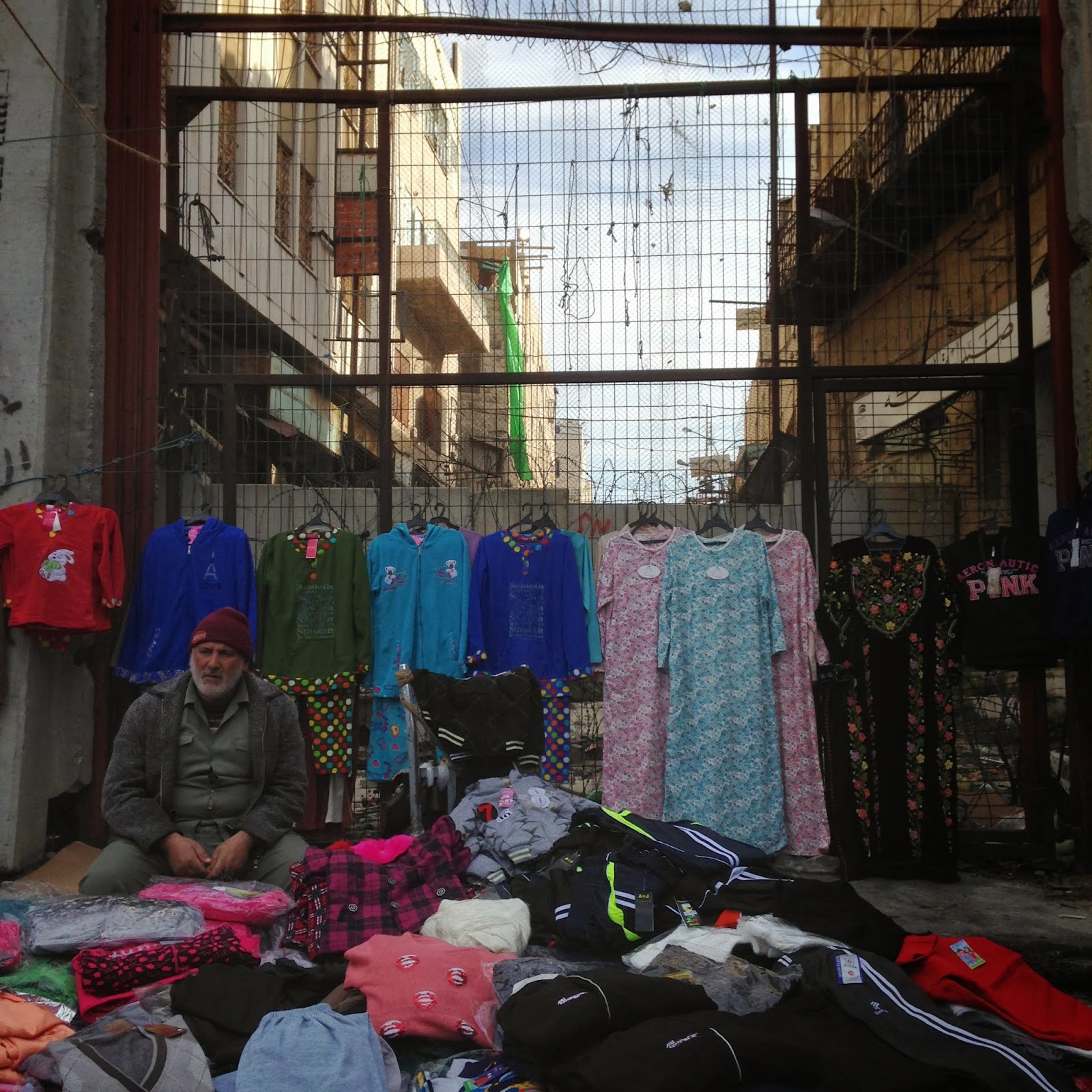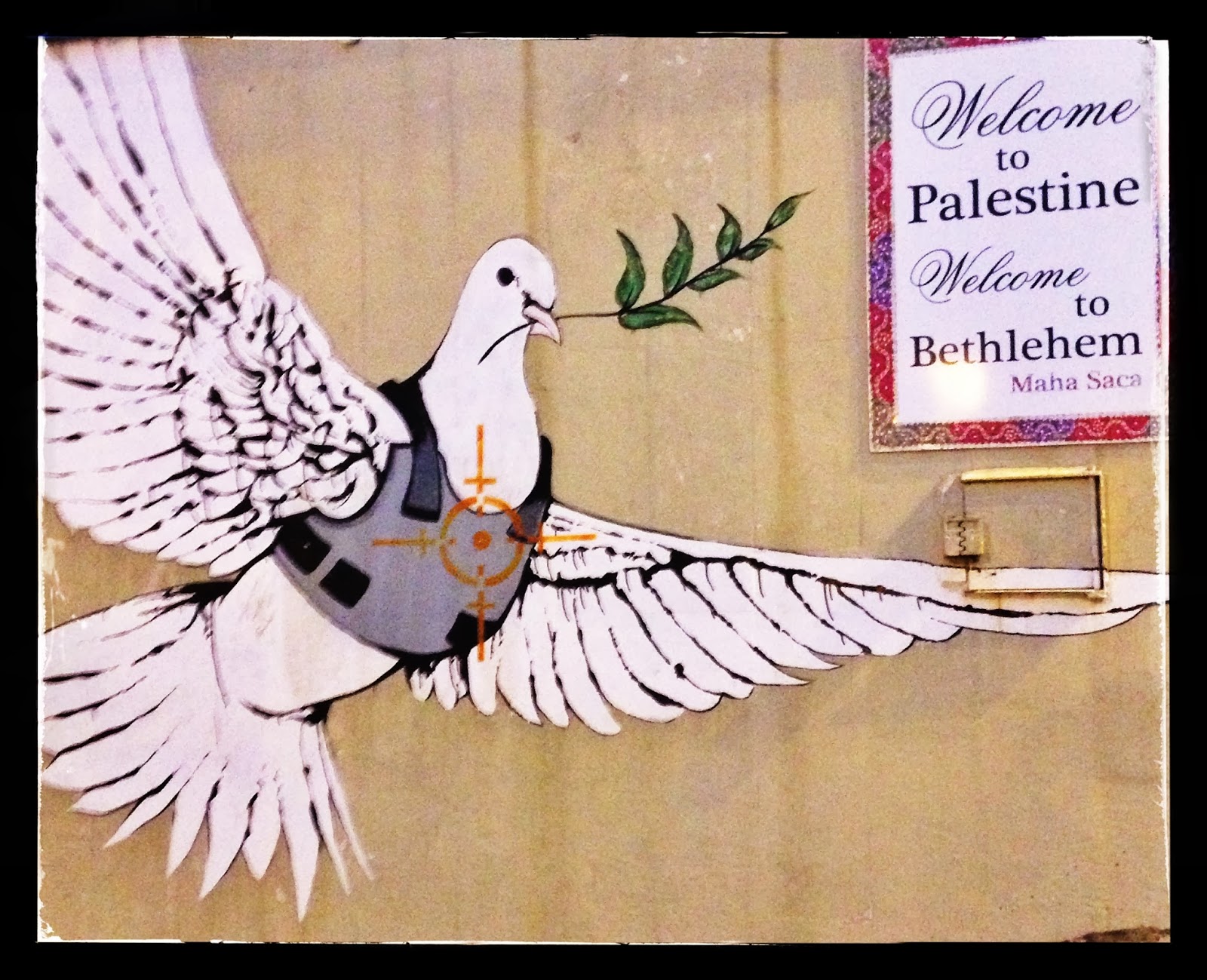Winter is the time to fly South. I make a small trip to Israel and the Occupied Palestinian Territories. Am lucky enough to enjoy the company of Mohamed Barakat from Green Olives and other knowledgeable persons who help me learn more about the region. During the few days am there am flooded by a myriad of thoughts while I enjoy the beauty of its sunsets, the taste of humus, pita bread, pomegranate juice, fresh mint tea, admire the landscapes in the Jordan Valley or get salty in the waters of the Dead Sea.
I am an outsider to this area of the world and still it feels so familiar, I think, while walking in the dark cold streets of the Old City of Jerusalem at night. I guess this land is part of every Westerner’s culture in a way. First, these same stones inspired three of the greatest world religions and the moral underpinnings of a large part of our global civilisation. Secondly, we all have grown used to news about bombings, protests, claims of human rights violations, a history of unending conflict. The images of the concrete wall are the quintessence of a damaged society. The graffiti on it are the promise that a better Israel and Palestine are at least imaginable.
This beautiful land and its polity is troubling to me from a very particular angle. My work and my research (primarily on Kosovo and other Balkan settings) centres on the management of diversity, the accommodation of diverse cultures through special measures (e.g., human rights institutions, participatory or advisory bodies, the prohibition of discrimination): the design of institutions to ensure that multicultural societies (that is all societies) are truly democratic and egalitarian. Human security in the widest sense. The point of departure of such policies are two understandings, which are common in the West. First, the idea of a mono-ethnic state is a long discredited chimera. Secondly, the way forward is inclusiveness and integration. Diversity –ethnic, cultural, religious, linguistic– is here to stay and it is to be managed politically and legally, the question is how.
As I walk through the long narrow fences of checkpoints, smell the tear gas, eye witness the occupation of land and houses, photograph the infamous wall or listen to sad explanations as to the different license plates and roads (for West Bankers, for Israeli citizens), the different rights afforded (or restricted) to persons according –in practice– to their ethnic background, I cannot but feel I have walked through a looking glass of human security. I see what seems to be the mirror image of a multicultural society.
 |
| Fence surrounding and covering the market in Hebron |
I mean, the fences over the roof of the market in Hebron, separating the passers by from the settlers living in the upper floors are simply abhorrent, the opposite of what a friendly city should be. It’s a hard bite to swallow for me: I lived nearly three years in the divided city of Mitrovica in Kosovo. I thought it to be pretty tough. But it was nothing compared to Hebron. While in Mitrovica there are separation lines (the Ibar river between the Albanian South and the Serbian North) one never feels so much in a dangerous bird cage as in Hebron. Indeed, the KFOR soldiers are not nearly half as trigger–happy as the IDF. Civilians do not go shopping with Kalashnikovs hanging from their shoulders.
Here in Hebron the abnormal is every day business. I witness how an old Imam sitting by his small mosque in Martyrs/King David Street stares at the IDF soldiers having coffee served by a settler while securing a checkpoint during a protest. The Temporary Presence in Hebron officers walk here and there with their notebooks and cameras. Security incidents are just routine. Concrete walls and fences have become part of the local architecture.
The sheer complexity of the measures in place makes any outsiders feel pretty ignorant. Areas A (under Palestinian Authority administration), B (under PA with IDF presence) and C (complete IDF control), restricted movement (even for farmers to work in their own land as in Qalqilya), aggressive questioning, disproportionate sanctions or blatantly unfair policies (e.g., East Jerusalem inhabitants loosing their residence status through a policy of “silent relocation”)… It seems that there is an ill will to make the ethnic “other” uncomfortable, humiliated, ready to leave. It is the direct opposite goal to the accommodation of cultural diversity.
The fact that the measures are complex and unpredictable is also a failure of a democratic legal system, which should be predictable, logical, foreseeable, even for visitors. Why can’t we all use the same roads? Is the security threat really so overwhelming and permanent that it justifies creating this insane institutional, political and social labyrinth? Doesn’t it reinforce it? I understand the fear and anger resulting from Hamas’ rockets, the memory of the suicide bombings, but I come from a country where a five decades old terrorist organisation (ETA) has laid down arms after heavy civil society, judicial and political pressure.
 |
| Inside the Church of the Holy Sepulchre |
I also visit the Holy Sepulchre, together with hordes of Russians rushing to touch the stone where the body of Jesus allegedly lied. In the morning I visited the Temple Mount (my third trip to Jerusalem, finally I understood its bizarre visitor’s schedule). Also the Wailing Wall… Everyone wants a piece of Jerusalem. And I wonder, can the space not be shared in a more simple manner? Historical claims to places like Jerusalem could perhaps create less conflict if they were less monopolistic. Does the Jewish, Muslim or Christian character of the city really mean that the representative of one of such (multi-layered) need to monopolise power (over symbols, policy, entry rights and mobility, etc)?
Why could not a polity such as Israel and the OPT in the future put in place a multi-cultural set up where different groups (be it Palestinians, Ethiopian Jews, Arab Catholics, Bedouins, you name it) are given special rights to protect their rights and traditions while sharing a common loyalty to a state made by democratic institutions? Is human security in Israel and Palestine an unrealistic dream? Shouldn’t the city that inspired so many important values of our world’s civilisation and culture inspire more than worry and gloom? Shouldn’t they set an example to other countries rather than a never-ending drama? On the other hand, how realistic is it to expect that the current set up will be socially, politically or even militarily sustainable in the long run? I think –as the usual young Ben Gurion Customs officers bombard me with questions as to whether I visited the West Bank or talked to any Palestinian– it is at least healthy to imagine things can and will change for the better.
Chema Arraiza is a researcher on ethnic diversity and conflict, he blogs here


Comment (0)